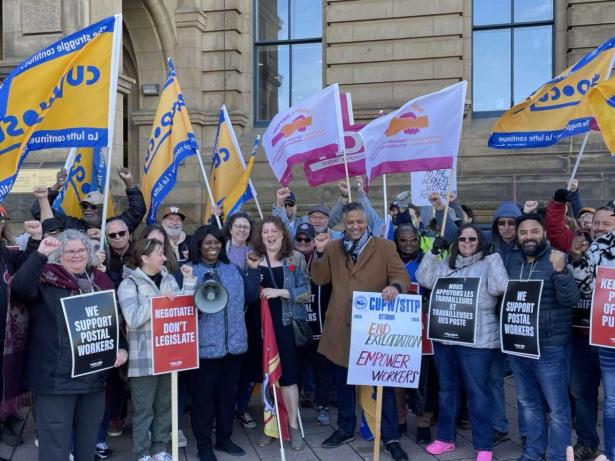labor Forcing Postal Workers Back to Work Misuse of Labour Code Says Canadian Labour Congress
Canada Post workers have been on strike for five weeks. On Tuesday morning, legal strike action ended after a decision from the Canada Industrial Relations Board (CIRB) which said operations were to resume.
On Friday, labour minister Steve MacKinnon asked CIRB to investigate whether the Canadian Union of Postal Workers (CUPW) and Canada Post were likely to reach a deal before the end of 2024. The Board found an agreement before the end of the year was unlikely and ordered postal workers back on the job.
Bea Bruske, president of the Canadian Labour Congress (CLC) said forcing postal workers back on the job is a “stark” reminder of the government’s willingness to interfere with workers’ rights.
“Undermining collective bargaining undermines democracy itself,” Bruske said in a statement.
This is the fourth time Section 107 of the labour code was used to end work stoppages this year. Under section 107, the labour minister “may refer any question to the [Canada Labour] board or direct the board to do such things as the minister deems necessary.”
In late June, then labour minister Seamus O’Regan directed the CIRB to impose binding arbitration on mechanics at Westjet who were set to strike. O’Regan said he “averted” a strike by doing this. CIRB did impose binding arbitration but WestJet mechanics were still allowed to strike.
The first time section 107 was used to bring striking workers off the picket line was in August when the government directed the CIRB to impose binding arbitration on locked rail workers and ensure the resumption of services.
Since then, section 107 has been used to force striking port workers and now postal workers back on the job.
“Such repeated interference not only infringes on these fundamental rights but also sets a dangerous precedent, signaling to employers that they can rely on the government to side with them instead of respecting the collective bargaining process,” Bruske said. “We demand an end to the abuse of Section 107 by the government, and clear guardrails to curtail the uses of this section at the whim of politicians.”
Postal workers were upset by the order back to work. Jan Simpson, president of CUPW said the labour board has stripped the right to strike from postal workers.
“We understand that members want to hold the line until the last minute to show our disgust with what is currently happening,” Simpson said in a statement. “ In our opinion, we have the right to question the Employer to ensure that the Employer’s access to the facilities is justified and is required to prepare for the resumption of the operations. Our obligation would be limited to allowing them access for that purpose only.”
Simpson said legal strike action may have ended, but the fight goes on. She said the union is still considering all options to achieve negotiated collective agreements.
Bruske said the CLC stands in solidarity with postal workers.With a federal election approaching, Bruske called on the government to “consult with unions and workers about the misuse of Section 107 and commit to respecting workers’ rights.”
“Government interventions that undermine collective bargaining rights only further tip the scales against working people,” she said. “The only path to lasting stability and fairness is mutual respect and good-faith negotiations—nothing less. We demand better for all workers across this country.”
Gabriela “Gabby” Calugay-Casuga (she/they) is a writer and activist based in so-called “Ottawa.” They began writing for Migrante Ottawa’s radio show, Talakayang Bayan, in 2017. Since then, she has written for CHUO FM and The Canadian Press. From the start of her journalism career, Gabby has focused on justice and human rights reporting. Gabby has also organized for social and economic justice with groups such as ACORN Canada, Diversify Canterbury and Anakbayan. Gabby is set to graduate from Carleton University’s Journalism and Humanities program in 2024 and she hopes to one day freelance from her own alpaca farm.
rabble.ca: We are an award-winning, independent, community-driven media. Among the first digital journalism organizations in Canada, and the first to incorporate as non-profit, rabble.ca has been at the forefront of reporting on national politics with a progressive lens that centres issues of social movements, of labour, and of grassroots activism.


Spread the word